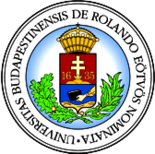 501-600
501-600 


The predecessor of Eötvös Loránd University (ELTE) was founded in 1635 in the rural town of Nagyszombat by Cardinal Péter Pázmány, as a catholic university for teaching Theology and Philosophy. In 1770-1780, the University was transferred to Buda and later to Pest, and with the support of Maria-Theresa, the Empress of Austria and Queen of Hungary, became the Royal Hungarian University. Over the following decades, new faculties were established to meet the expectations of a learned society. In the second half of the 19th century, the University developed into a centre of modern higher education in today's sense, covering nearly every scholarly field. In 1950 the university was reorganized and adopted its present name. It was named after one of its professors, the world-famous physicist, Loránd Eötvös. Recently, a new campus has been built on the scenic banks of the Danube for the Faculties of Natural and Social Sciences and Informatics. Currently, the university has eight faculties: Science, Informatics, Law and Political Sciences, Humanities, Social Sciences, Education and Psychology, Elementary and Nursery School Teacher Training and the Bárczi Gusztáv Faculty of Special Education. Eötvös Loránd University is internationally recognized and its programs are accredited by the Hungarian Accreditation Board. The diplomas issued by Eötvös Loránd University are acknowledged worldwide, and its course credits are transferable in all countries in the European Union. Over the last hundred years, Eötvös Loránd University (ELTE) has had many world famous scientists and four Nobel Prize laureates among its teachers and alumni. The current number of students enrolled yearly has reached 32 000, and there is an academic staff of 1800 highly-qualified teachers and researchers.
 501-600
501-600 
| Subject | Rank |
|---|---|
Mathematics | 151-200 |
Physics | 201-300 |
Veterinary Sciences | 201-300 |
Ecology | 301-400 |
Biological Sciences | 301-400 |
Education | 301-400 |
Psychology | 301-400 |
| Undergraduate Programs |
|---|
Adult Education |
Ancient Cultures, Languages And Fields of Classical Philology |
Ancient Languages And Cultures |
Applied Economics |
Biology |
Chemistry |
Communication and Media Studies |
Earth Sciences |
Eastern Languages And Cultures Korean Specialty |
Eastern Languages And Cultures, Mongolian Specialty |
Eastern Languages And Cultures, Specialization Indology |
Eastern Languages And Cultures-Arab Specialization |
Eastern Languages And Cultures-Chinese Specialties |
Eastern Languages And Cultures-Iranian Studies Specialization |
Eastern Languages And Cultures-Japanese Specialty |
Eastern Languages And Cultures-Tibet Branch |
Ecology |
English Studies |
Ethnography |
Geography |
History |
Hungarian |
Infant and Young Child In A Foster |
Information Librarian |
International Studies |
Judicial Administration |
Kindergarten Teacher |
Kindergarten Teacher-German Ethnic Specialization |
Kindergarten Teachers Serbs Ethnic Specialization |
Labour and Social Security Administration |
Liberal Arts |
Mathematics |
Oriental Languages And Culture, Modern Greece |
Oriental Languages And Cultures, Turkey |
Pedagogy |
Physics |
Political Science |
Psychology |
Recreation and Health Promotion |
Romance and French Specialty |
Romance and Italian Specialties |
Romance of The Spanish-Specialization |
Romance Romanian-Specialization |
Romance-Portuguese Specialty |
Slavic and Croatian Specialties |
Slavic and Czech Specialties |
Slavic and Slovenian Specialties |
Slavic and Ukrainian Specialties |
Slavic-Bulgarian Branch |
Slavic-Polish Specialty |
Slavic-Russian Specialization |
Slavic-Serbian Specialties |
Slavic-Slovak Specialization |
Social Studies |
Social Work |
Sociology |
Software Engineering (In English) |
Special Education |
Specialization In History and Archaeology |
Sports Organizers |
Teacher |
Teacher-German Ethnic Specialization |
Teacher-Serbian Ethnic Specialization |
Vocal Music |
| Graduate Programs |
|---|
Adult Education |
Aesthetics |
American |
Applied Linguistics |
Applied Mathematics |
Arabic Studies |
Archeology |
Archives |
Art History |
Assyriological |
Astronomer |
Biology |
Biology Teacher |
Biophysicist |
Bulgarian Language and Literature |
Cartographer |
Chemist |
Chemistry Teacher |
Classical Philology |
Communication and Media Studies |
Community and Civic Studies |
Criminology |
Croatian and Croatian-Ethnic Teachers |
Croatian Language and Literature |
Cultural Anthropology |
Czech Language and Literature |
Eco-School Teacher |
Economic Analysis |
Egyptology |
English Studies |
English Teacher |
Environmental Science |
Ethnic German Language and Literature |
Ethnic Ukrainian and Ukrainian-Teacher |
Ethnography |
Family and Child Protection Teacher |
Film Studies |
French Language, Literature and Culture |
French Teacher |
Game-And Leisure-Teacher Organization |
Geography |
Geography Teacher |
Geologist |
Geophysicist |
German and German-Minority Teachers |
German Language, Literature and Culture |
German Professor |
Health Policy, Planning and Finance |
History |
History Teacher |
Hungarian As A Foreign Language Teacher |
Hungarian Language and Literature |
Hungarian Teacher |
Hungarology |
Indology |
Information Librarian |
Insurance and Financial Mathematics |
Intercultural Psychology and Pedagogy |
International Studies |
Iranian Studies |
Islamic Studies |
It Teacher |
Italian Language, Literature and Culture |
Italian Teacher |
Language and Speech Teacher |
Latin Teacher |
Lawyer |
Literature, Science and Culture |
Logic and Theory of Science |
Materials |
Math Teacher |
Mathematician |
Meteorologist |
Minority Policy |
Multicultural Education Teacher |
Pedagogy |
Philosophy |
Philosophy Professor |
Physicist |
Physics Teacher |
Polish and Polish-Minority Teachers |
Polish Language and Literature |
Political Science |
Portuguese Language, Literature and Culture |
Portuguese Teachers |
Psychology |
Religious Science |
Renaissance Studies |
Romania and The Romanian Minority-Teacher |
Romanian Language, Literature and Culture |
Russian Language and Literature |
Russian Teachers |
Science Communication In Science |
Semiotics |
Serbian Language and Literature |
Serbs and Ethnic-Serbian Teachers |
Singing and Music Teachers |
Sinology |
Slovak and Slovak-National Teachers |
Slovak Language and Literature |
Slovenian and Slovenian-Minority Teachers |
Slovenian Language and Literature |
Social |
Social Work |
Sociology |
Software Engineering |
Spanish Language, Literature and Culture |
Spanish Teacher |
Special Education |
Statistical Survey |
Teacher |
Teacher Education |
The History of Museology |
Theoretical Linguistics |
Translators and Interpreters |
Ukrainian Language and Literature |